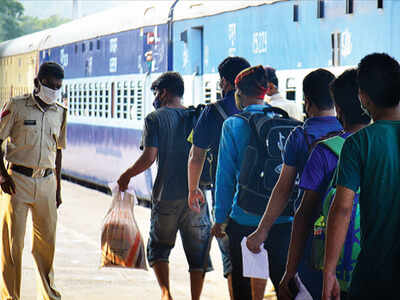
PANAJI: Ever since the Centre allowed migrant workers to cross state borders and head home, more than 70,000 of them have left Goa for their respective states. Now with the wheels of economy slowly turning, some have opted to stay put and the number of inmates at shelter homes appears to be tapering off, government officials said.
On Thursday, a Shramik Special train departed for Uttar Pradesh with just 980 passengers even though the train has a 1,500 capacity. On Tuesday officials could not find enough passengers for a Shramik Special train bound for Odisha and have decided to postpone other trains planned for the state.
“Many workers are not going, especially those involved in fishing activity, since fishing has been permitted till June 15. Even construction workers are holding on,” a senior government bureaucrat said.
More than 8,000 fishermen from Jharkhand, Odisha, West Bengal and Chhattisgarh remain in the state and are likely to leave only after the fishing season comes to an end.
Officials said that attempts to convince workers to stay back in Goa have partially paid off and the exodus is lower than earlier estimated. “It is better to retain these people in Goa. Some members have convinced majority of their workers to stay,” director general of Goa Chamber of Commerce and Industry, Ramakant Kamat said.
As of Wednesday, there were 3,100 migrant labourers and stranded people at relief camps and shelter homes in the state.
“Initially these people were keen on going home because there was no work here, they couldn’t afford to pay rent and they wanted to see their people. Now that work has started, they are ready to stay back,” said an IAS officer involved in the exercise to ferry the workers home.
This is not to say that Goa’s industrial sector has not felt the impact of the 70,000 workers who have left. The hospitality sector will not feel the brunt, but the construction sector, logistics, transportation and smaller sectors are facing a shortage of workers.
Kamat hopes that the current situation has been a lesson for those who criticise migrant workers. “We find in many places there is a shortage of labour. This is a learning curve for us and we should learn the value of the migrants to the economy,” Kamat said.
A Konkan Railway official said that with trains operating well below the passenger capacity, the need for Shramik Special trains is being reassessed.
“The state government is assessing the requirements,” the Konkan Railway official said.
On Thursday, a Shramik Special train departed for Uttar Pradesh with just 980 passengers even though the train has a 1,500 capacity. On Tuesday officials could not find enough passengers for a Shramik Special train bound for Odisha and have decided to postpone other trains planned for the state.
“Many workers are not going, especially those involved in fishing activity, since fishing has been permitted till June 15. Even construction workers are holding on,” a senior government bureaucrat said.
More than 8,000 fishermen from Jharkhand, Odisha, West Bengal and Chhattisgarh remain in the state and are likely to leave only after the fishing season comes to an end.
Officials said that attempts to convince workers to stay back in Goa have partially paid off and the exodus is lower than earlier estimated. “It is better to retain these people in Goa. Some members have convinced majority of their workers to stay,” director general of Goa Chamber of Commerce and Industry, Ramakant Kamat said.
As of Wednesday, there were 3,100 migrant labourers and stranded people at relief camps and shelter homes in the state.
“Initially these people were keen on going home because there was no work here, they couldn’t afford to pay rent and they wanted to see their people. Now that work has started, they are ready to stay back,” said an IAS officer involved in the exercise to ferry the workers home.
This is not to say that Goa’s industrial sector has not felt the impact of the 70,000 workers who have left. The hospitality sector will not feel the brunt, but the construction sector, logistics, transportation and smaller sectors are facing a shortage of workers.
Kamat hopes that the current situation has been a lesson for those who criticise migrant workers. “We find in many places there is a shortage of labour. This is a learning curve for us and we should learn the value of the migrants to the economy,” Kamat said.
A Konkan Railway official said that with trains operating well below the passenger capacity, the need for Shramik Special trains is being reassessed.
“The state government is assessing the requirements,” the Konkan Railway official said.
Quick Links
Kerala Coronavirus Helpline NumberHaryana Coronavirus Helpline NumberUP Coronavirus Helpline NumberBareilly NewsBhopal NewsCoronavirus in DelhiCoronavirus in HyderabadCoronavirus in IndiaCoronavirus symptomsCoronavirusRajasthan Coronavirus Helpline NumberAditya ThackerayShiv SenaFire in MumbaiAP Coronavirus Helpline NumberArvind KejriwalJammu Kashmir Coronavirus Helpline NumberSrinagar encounter
Get the app








